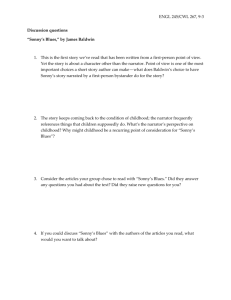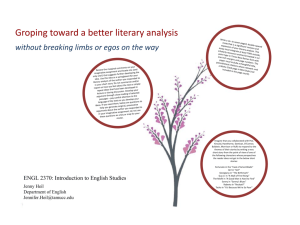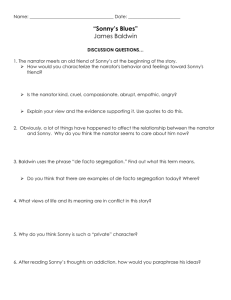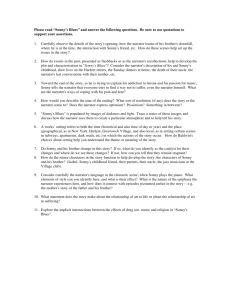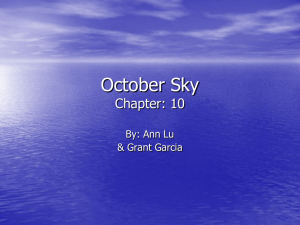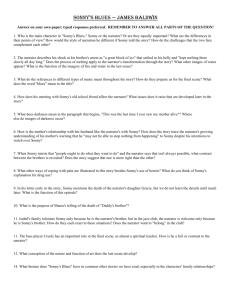Final Draft
advertisement
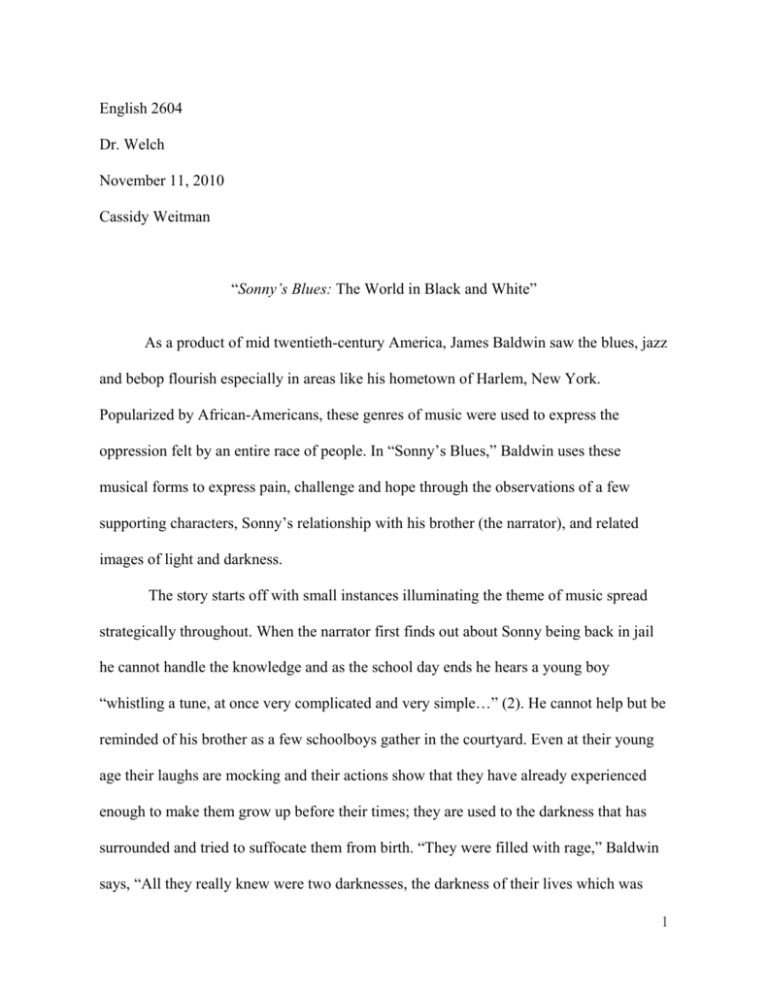
English 2604 Dr. Welch November 11, 2010 Cassidy Weitman “Sonny’s Blues: The World in Black and White” As a product of mid twentieth-century America, James Baldwin saw the blues, jazz and bebop flourish especially in areas like his hometown of Harlem, New York. Popularized by African-Americans, these genres of music were used to express the oppression felt by an entire race of people. In “Sonny’s Blues,” Baldwin uses these musical forms to express pain, challenge and hope through the observations of a few supporting characters, Sonny’s relationship with his brother (the narrator), and related images of light and darkness. The story starts off with small instances illuminating the theme of music spread strategically throughout. When the narrator first finds out about Sonny being back in jail he cannot handle the knowledge and as the school day ends he hears a young boy “whistling a tune, at once very complicated and very simple…” (2). He cannot help but be reminded of his brother as a few schoolboys gather in the courtyard. Even at their young age their laughs are mocking and their actions show that they have already experienced enough to make them grow up before their times; they are used to the darkness that has surrounded and tried to suffocate them from birth. “They were filled with rage,” Baldwin says, “All they really knew were two darknesses, the darkness of their lives which was 1 now closing in on them, and the darkness of the movies, which had blinded them to that other darkness…” (2). There was no light to work toward for these boys, they were born into a lose-lose situation. One, lone boy reminds the narrator of his brother Sonny because he is already employing music to escape the pain he feels as a young man trapped in this environment and being tested by his peers. Baldwin describes the whistling as a noise that “sounded very cool and moving through all that harsh, bright air, only just holding its own through all the other sounds” (2). The boy can relate to the tune in this event because just as it is being challenged and nearly drowned out by all the other sounds around it, it is trying to get through and make its presence known. With society doing everything in its power to keep him down this young boy is determined to get his mind off his circumstances and otherwise occupy his thoughts. The tune he is whistling gives the narrator a sense of hope for the boy. Just as this boy in the courtyard employed music to get away the barmaid dancing to the beat of the jukebox working in the corner bar lets herself get lost in the tracks. Baldwin describes her as dancing from place to place, keeping time with the music but the melody cannot cover up the fact that: “When she smiled one saw the little girl, one sensed the doomed, still struggling woman beneath the battered face of the semi-whore” (4). The pain she feels is written all over her face and she uses the music as an escape from her worries. With the lyrics consuming her thoughts there is no time to think about what bill is overdue or the fact that she is stuck in this little corner bar and seems to be hit by a new challenge daily. When the music suddenly stopped, “the barmaid paused and watched the jukebox until the music began again” (5). She needed the music to help her mind stay 2 somewhat at ease. As it comes back on and she continues to dance, the narrator is again left with a sense of hope for this barmaid he has been casually observing. Sonny’s relationship with the narrator, his brother, is defined by music throughout the story. When the narrator returns home on a furlough for their mother’s funeral he tries “to find something out about [Sonny]” (14). He just wants to know something and he discovers that his brother wants to be a professional musician. When the narrator finds this out he cannot fathom why Sonny would see Charlie “Bird” Parker as a role model and want to structure his life in the same way, around music and things that come with the industry. Sonny’s older brother thinks being a musician would hinder Sonny’s talent and it takes a long time for him to realize that it is all that keeps him sane. Sonny tries to explain the importance of music from the beginning and says: “But what I don’t seem to be able to make you understand is that it’s the only thing I want to do” (16). He attempts to express his love for the art and the fact that it eases his pain but his brother does not want to hear it. Even though he does not understand Sonny’s passion for music the narrator uses a piano that is at his in-laws’ house as a bribe to get Sonny to move in after their mother’s death. The piano became Sonny’s lifeline. Isabel, the narrator’s wife, writes that Sonny is always at the piano; he plays all day and all night. She said, “it wasn’t like living with a person at all, it was like living with sound” (19). Although his brother was not around to experience Sonny’s addiction to this instrument he still noticed what was happening and he begins to understand the music is Sonny’s escape, his outlet. Everyone silently dealt with the playing “because even they dimly sensed, as [the narrator] sensed, from so many 3 thousands of miles away, that Sonny was at that piano playing for his life” (19). But when Isabel’s family found out that he was not going to school and spending his time in Greenwich Village they let him know how they felt and that day Sonny did not play music for the first time since he moved in. Baldwin shows the seriousness of that event when he writes: “The silence of the next few days must have been louder than the sound of all the music ever played since time began” (20). Everyone in the house knew the damage that day did to Sonny and there was no way to go back, to take back what Isabel’s family said and the pain it made him feel. While the narrator seems to understand why Sonny is so hurt by this event he only truly begins to listen at the street revival. The narrator says: “the music seemed to soothe a poison out of them,” speaking of the brother and three sisters singing outside the barbeque joint. The music is a kind of therapy for these people. It is here Sonny is able to open up to his brother for the first time about many aspects of his life including his heroin use. Sonny tells his brother that the singer’s voice: “…reminded [him] for a minute of what heroin feels like sometimes-when it’s in your veins…It makes you feel-in control. Sometimes you’ve got to have that feeling” (24). Since Sonny was not in control of many things in his life he used music to cope and also found something that makes him feel in control. He opens up about the pain he feels and tries to explain why he turns to drugs when he says: “…there’s no way not to suffer. But you try all kinds of ways to keep from drowning in it, to keep on top of it” (25). Here the narrator begins to understand that his brother is trapped by their environment and is swiftly drowning. 4 As the two brothers try to pick up their relationship when Sonny gets out of jail it is in the final tavern scene that so much is brought to the surface and explored between them. When they first arrive at the bar Sonny’s brother is introduced to some of the fellow band members and he gets a sense that he failed his mother because he was not there for Sonny like he should have been. Creole introduces himself and says: “I’m glad to meet you, son” but the narrator takes that as he was glad to finally see somebody supporting Sonny, he was glad that someone was there. It turns out to be a painful experience because he is remembering his mother’s wish and he starts to realize that when his brother needed him most other things had seemed more important. The challenge now is making it up to Sonny and being the older, nurturing brother. Shortly after arriving at the bar, the narrator learns a great deal about his brother and the kind of life he has lived. As the band members start to play the first set the narrator gets a glimpse into Sonny’s soul. The narrator is not a musician but he still appreciates the significance of the art. That respect is apparent when he says: “All I know about music is that not many people ever really hear it. And even then, on the rare occasions when something opens within, and the music enters what we mainly hear, or hear corroborated, are personal, private, vanishing evocations. But the man who creates the music is hearing something else, is dealing with the roar rising from the void and imposing order on it as it hits the air. What is evoked in him, then, is of another order, more terrible because it has no words, and triumphant too, for that same reason. And his triumph, when he triumphs, is ours” (30). Sonny can control the music, he can manipulate the instrument to do exactly what he wants it to do. That sense of control keeps Sonny 5 from completely drowning, it gives him an outlet for his pain. The band members are strategically placed just out of the light in the shadows of the stage, again paralleling the darkness that they felt they were always in. As the narrator watches his brother working to tame the sound the pain and suffering is in Sonny’s eyes. He is not in control of the instrument like he usually would be. What happens if he can’t gain control back? The challenge of reigning in the songs at the beginning of the set was weighing on Sonny but his relationship with the music is strong enough that he transforms himself during the second set. Creole set the stage for the connection and when it came together the chemistry was once again magical. The narrator describes it as a conversation between the band members, mostly Creole and Sonny and “Creole seemed to be saying, listen. Now these are Sonny’s Blues” (31). As Sonny finally let go and let the music take him away, his brother witnessed the release of his pain and could not help but feel a sense of hope for the future. Sitting in the corner of a dark bar the narrator finally figures out the connection and wants to be part of it saying: “Freedom lurked around us and I understood, at last, that he could help us to be free if we would listen, that he would never be free until we did” (31-32). Because of this newfound knowledge the narrator finally feels hopeful and has developed a mindset that he and Sonny will take on the world outside together from then on. The common theme in “Sonny’s Blues,” when dealing with the pain, challenges and hope experienced by the main characters, the brothers, is music. The biblical allusion to the cup of trembling, the cup that glowed under the indigo lights of the stage as Sonny prepared for another set, gave the story a sense of hope with the idea that the once 6 afflicted would no longer be tormented but there is still a lot for Sonny still has a lot of issues to work through. As mentioned before, Charlie “Bird” Parker was one of Sonny’s biggest influences, someone he modeled himself after. He was an amazing musician but he was also addicted to heroin. Sonny wrestles with the idea that the heroin makes him a better performer and also allows him to feel in control and play along with the hand he has been dealt. It is ironic because the root of much of his pain and the reason that he cannot escape his past, not that anybody truly can, is his drug addiction. But at the same time if music is his only lifeline, what keeps him from drowning, and heroin helps that aspect why would he quit it? All of these issues are reflected in the blues, jazz and bebop they play; a musician’s deepest secrets can come through in a blues song. So as the pain and challenges are temporarily masked by the hope music brings, they are just that, temporarily displaced, never forgotten. But why dwell on things you cannot control? Why not just let the music take you away? 7 Works Cited Baldwin, James. “American Short Story Masterpieces”. Sonny’s Blues.Random House, Inc. New York, New York, 1987. Print. 1-32. 8

